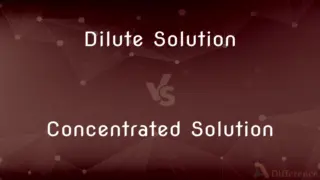Job Title vs. Occupation — What's the Difference?
By Tayyaba Rehman — Published on November 1, 2023
A Job Title specifies a particular role within an organization, e.g., "Software Engineer." Occupation refers to a broader field of work or profession, e.g., "Engineering."

Difference Between Job Title and Occupation
Table of Contents
ADVERTISEMENT
Key Differences
A Job Title is a specific designation that describes an individual's position within an organization. It often outlines the nature of the job and the duties associated with it. For example, within the field of healthcare, there could be Job Titles like "Pediatric Nurse," "Radiologist," or "General Surgeon."
Occupation, on the other hand, is a more general term that describes a person's field of work or professional activity. Instead of pointing to a particular role, it classifies individuals based on the nature of their job as a whole. Using the previous example, while there are many job titles in healthcare, the Occupation might simply be "Healthcare Professional" or "Medical Practitioner."
Another way to differentiate between Job Title and Occupation is by examining their specificity. A Job Title is usually more specific and might even be unique to certain organizations. For instance, one company might have a Job Title of "Chief Happiness Officer," which could relate to HR or employee well-being. Another company might not have this title at all.
Conversely, Occupation tends to be more generalized. Multiple Job Titles could fall under a single Occupation. For instance, both a "Tax Accountant" and a "Forensic Accountant" would have their Occupation classified as "Accounting."
Finally, when individuals introduce themselves professionally, they might mention their Job Title to specify their role in a particular company. In more general conversations, however, people might reference their Occupation to give a broader idea of their field of work.
ADVERTISEMENT
Comparison Chart
Specificity
Specific to a role (e.g., Marketing Manager)
Broad (e.g., Marketing)
Scope
Narrow, pertaining to a particular organization
Wide, can encompass various job titles
Used in
Resumes, business cards, official communications
General conversations, demographic surveys
Example in Healthcare
Pediatric Nurse
Healthcare Professional
Dependency
Can vary by organization
Remains consistent across industries
Compare with Definitions
Job Title
A term used to describe a person's position within an organizational hierarchy.
As someone with the Job Title Vice President, she's just below the CEO.
Occupation
A broad category of jobs that share similar characteristics.
Her Occupation is in the field of education.
Job Title
A label that defines an individual's particular responsibilities.
With the Job Title Project Manager, he oversees several teams.
Occupation
The primary activity that a person does to earn a living.
His Occupation requires him to travel frequently.
Job Title
A formal indication of an employee's role.
His business card shows his Job Title as Chief Financial Officer.
Occupation
A general description of one's professional field.
She listed her Occupation as Journalism on the survey.
Job Title
An official name given to a specific job function.
After her promotion, her new Job Title became Senior Analyst.
Occupation
The main work or business someone is involved in.
His Occupation in the tech world involves software development.
Job Title
A specific designation of one's role in a company.
Her Job Title at the tech firm is Front-End Developer.
Occupation
An activity that serves as one's regular source of livelihood; a vocation.
Occupation
An activity engaged in especially as a means of passing time; an avocation.
Occupation
The act or process of holding or possessing a place.
Occupation
The state of being held or possessed.
Occupation
Invasion, conquest, and control of a nation or territory by foreign armed forces.
Occupation
The military government exercising control over an occupied nation or territory.
Occupation
An activity or task with which one occupies oneself; usually specifically the productive activity, service, trade, or craft for which one is regularly paid; a job.
Occupation
The act, process or state of possessing a place.
Occupation
The control of a country or region by a hostile military and/or paramilitary force.
Occupation
The act or process of occupying or taking possession; actual possession and control; the state of being occupied; a holding or keeping; tenure; use; as, the occupation of lands by a tenant.
Occupation
That which occupies or engages the time and attention.
Occupation
The principal business of one's life; the principal work by which one earns one's livelihood; vocation; employment; profession; calling; trade; avocation; as, these days many people continue to practice their occupation well into their seventies.
Absence of occupation is not rest.
Occupation
The principal activity in your life that you do to earn money;
He's not in my line of business
Occupation
The control of a country by military forces of a foreign power
Occupation
Any activity that occupies a person's attention;
He missed the bell in his occupation with the computer game
Occupation
The act of occupying or taking possession of a building;
Occupation of a building without a certificate of occupancy is illegal
Occupation
The period of time during which a place or position or nation is occupied;
During the German occupation of Paris
Occupation
A person's regular employment or profession.
Her Occupation as a lawyer keeps her busy.
Common Curiosities
Is Job Title more company-specific?
Yes, Job Titles can vary by organization and might even be unique to certain companies.
Can one Occupation encompass multiple Job Titles?
Yes, for instance, the Occupation "Healthcare" could include Job Titles like "Nurse," "Doctor," and "Radiologist."
In which situations might one use their Job Title?
In professional settings, on resumes, business cards, or when specifying their role in an organization.
Is Occupation consistent across industries?
Yes, Occupations remain relatively consistent, like "Engineering" or "Education," across different companies and industries.
Is Occupation more static than Job Title?
Generally, yes. While Job Titles can vary and change, Occupations tend to remain consistent.
Can my Job Title change without my Occupation changing?
Absolutely. For instance, you could go from "Associate Editor" to "Editor-in-Chief," but your Occupation remains in "Publishing."
How can I describe my Occupation if I work in a niche field?
You can generalize it to fit under a broader category or describe the main activities or skills associated with it.
How is Occupation typically used?
Occupation is often referenced in general conversations or when giving a broad idea of one's field of work.
Why is it important to have a clear Job Title?
A clear Job Title provides clarity on an individual's responsibilities and position within an organization.
How does Occupation differ from Job Title?
Occupation refers to a broader field or profession, while a Job Title is specific to an individual's role.
Can a person have multiple Job Titles?
Yes, especially if they hold multiple roles or positions within an organization or across different organizations.
What does a Job Title indicate?
A Job Title specifies an individual's particular role or position within an organization.
Can my Job Title and Occupation be the same?
In some cases, yes. For instance, a "Dentist" might have both the Occupation and Job Title of "Dentist."
Is the distinction between Job Title and Occupation significant?
Yes, understanding the difference can provide clarity in professional settings and when discussing careers more broadly.
How can I determine the right Job Title for a role?
Consider the specific duties, responsibilities, and level of the role within the organization's hierarchy.
Share Your Discovery

Previous Comparison
Dilute Solution vs. Concentrated Solution
Next Comparison
Rankine Cycle vs. Brayton CycleAuthor Spotlight
Written by
Tayyaba RehmanTayyaba Rehman is a distinguished writer, currently serving as a primary contributor to askdifference.com. As a researcher in semantics and etymology, Tayyaba's passion for the complexity of languages and their distinctions has found a perfect home on the platform. Tayyaba delves into the intricacies of language, distinguishing between commonly confused words and phrases, thereby providing clarity for readers worldwide.












































